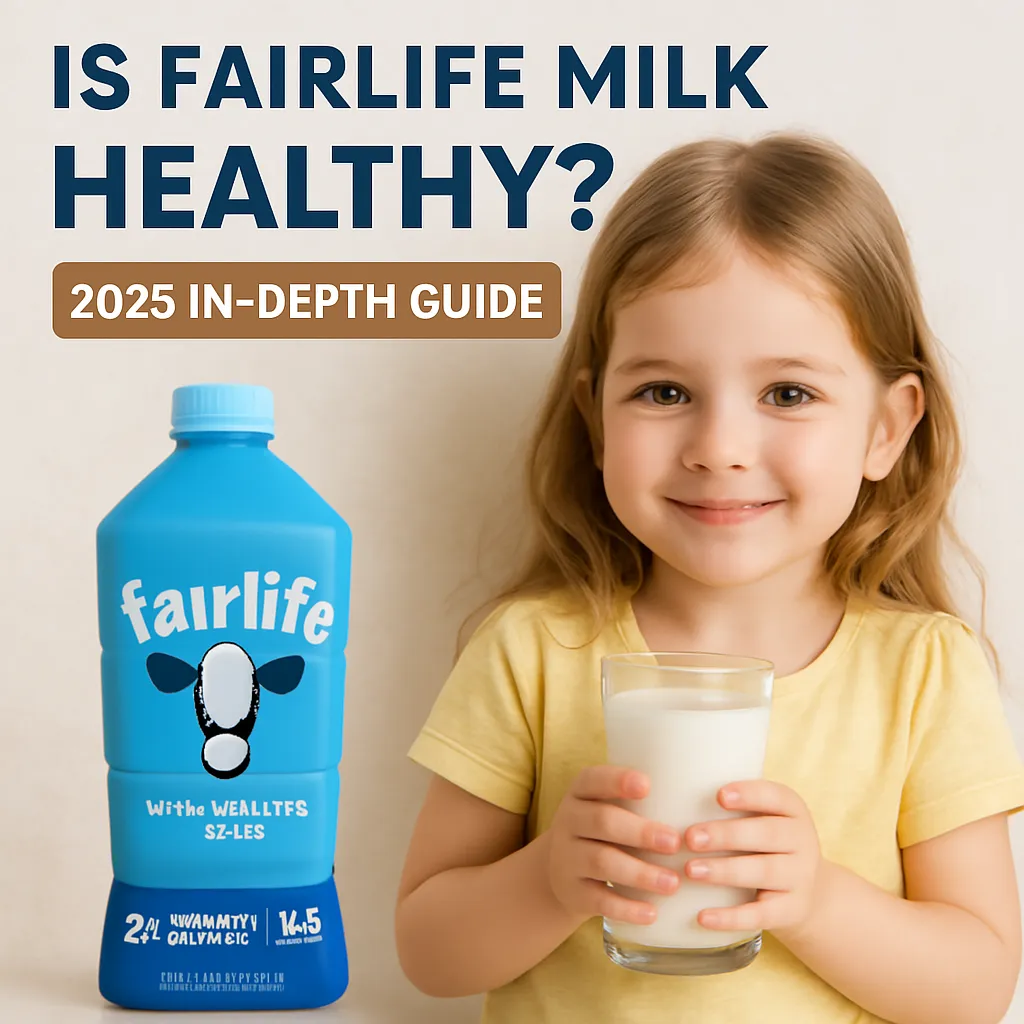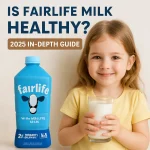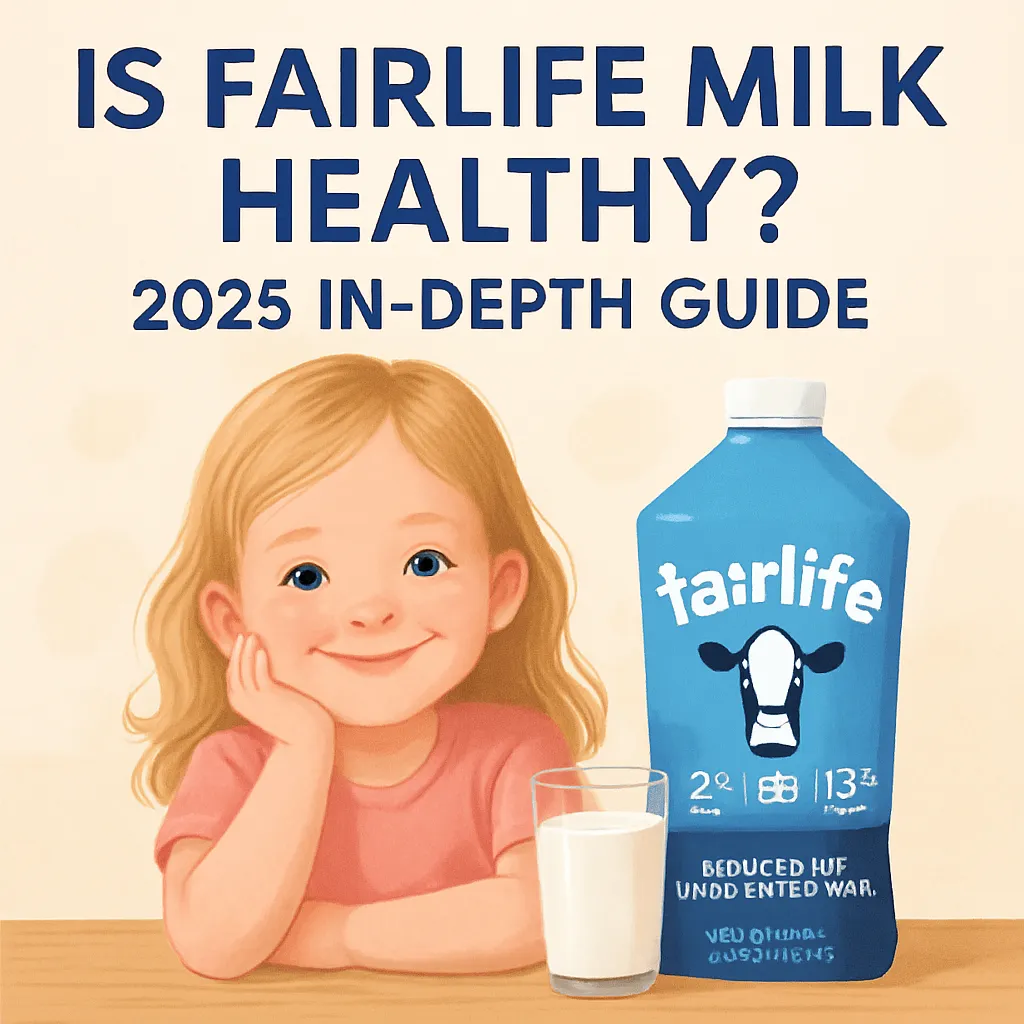
Table of Contents
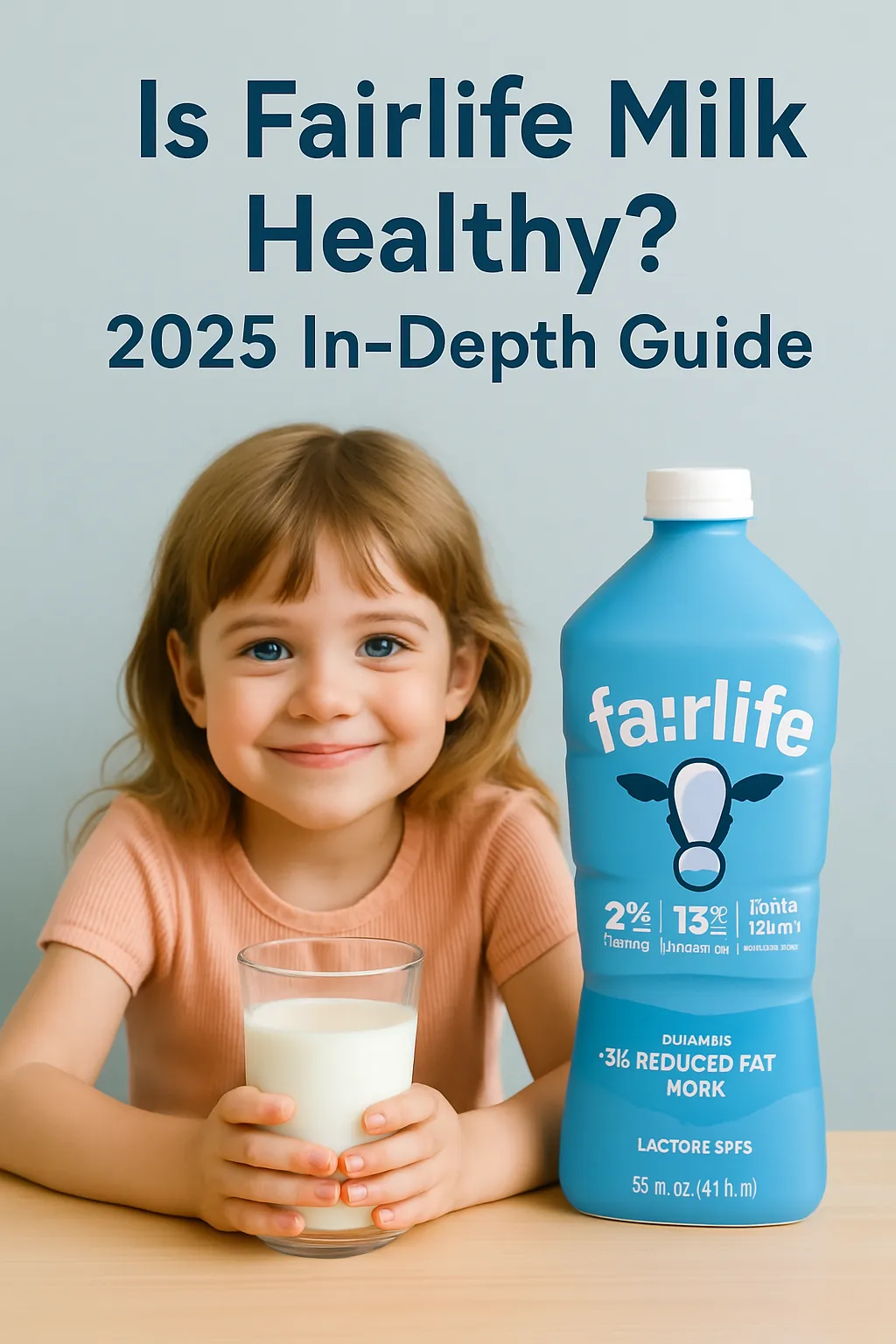
🥛 Is Fairlife Milk Healthy? 2025 In-Depth Guide
🧭 Introduction
Fairlife milk has made headlines over the past few years for its ultra-filtration process, high protein content, and claims of being easier on the stomach. But is it really healthy in 2025?
Whether you’re comparing it to organic dairy, traditional milk, or plant-based alternatives, it’s worth diving deep into the nutrition, science, production, and controversies surrounding Fairlife milk.
In this comprehensive guide, we’ll analyze:
- 🧪 The nutritional value
- 🧫 Processing techniques
- 🚨 Health benefits vs. risks
- 📊 Expert and government-backed data
- 🌿 Ethical and animal welfare claims
🧪 What Is Fairlife Milk?
Fairlife is a ultra-filtered milk brand owned by The Coca-Cola Company. It’s marketed as:
✅ High-protein
✅ Lactose-free
✅ Lower in sugar
✅ Enhanced with calcium
Ultra-filtration separates milk into its component parts — water, protein, lactose, vitamins, and minerals — allowing for recombination into a more nutritionally dense product.
📌 Fun Fact: Fairlife contains 50% more protein and 30% more calcium than traditional milk!
🧾 Fairlife vs Regular Milk: Nutrition Table (per 1 cup, 240ml)
| Nutrient | Fairlife Whole Milk | Regular Whole Milk | % Difference |
|---|---|---|---|
| Calories | 150 | 150 | — |
| Protein | 13g | 8g | +62.5% |
| Sugar | 6g | 12g | -50% |
| Calcium | 400mg | 276mg | +45% |
| Lactose | 0g | ~12g | -100% |
| Fat | 8g | 8g | — |
📚 Source: USDA | Fairlife Official Site
🧠 Health Benefits of Fairlife Milk
1. 🏋️♂️ High Protein Content
With 13 grams of protein per cup, Fairlife milk is ideal for:
- Athletes 💪
- Muscle repair post-workout
- Older adults fighting sarcopenia
- Kids in growth spurts
✅ Backed by research: According to the National Institutes of Health (NIH), higher-protein dairy can enhance satiety and lean mass preservation.
2. 🚫 Lactose-Free
Fairlife uses enzymatic treatment to break down lactose — great for people with lactose intolerance.
👨⚕️ Stat: ~36% of Americans report lactose intolerance symptoms.
📚 Source: NIH Lactose Intolerance Fact Sheet
3. 🦴 Bone-Boosting Calcium
Fairlife has 45% more calcium than standard milk — vital for:
- Teens 🧒
- Pregnant women 🤰
- Post-menopausal women 👵
📉 Downsides: What Are the Concerns?
While Fairlife touts benefits, not everything is rosy 🌹.
1. 🚨 Ultra-Processed Concerns
Critics argue that ultra-filtering is a form of food processing that may denature natural milk properties.
- Some dietitians favor less-processed dairy.
- Others worry about gut microbiota disruption from filtered products.
⚠️ Still under research — no clear long-term studies as of 2025.
2. 🧫 Use of Enzymes and Additives
Fairlife includes added lactase (enzyme) and vitamin D3, which are common but may concern those seeking “whole food” dairy options.
📌 “Just because it’s lactose-free doesn’t make it 100% natural.” — Nutritionist Valerie Segovia, RD, 2025
📄 Fairlife Milk 2025 Product Comparison (Quick Form)
🧾 Fill out this form to choose the best Fairlife milk for your needs:
✅ Choose Your Fitness or Health Goal:
- Weight Loss
- Muscle Gain
- Bone Health
- Lactose-Free Diet
✅ Choose Your Preferred Fat Content:
- Fat-Free
- 2% Reduced Fat
- Whole Milk
✅ Flavor Preferences:
- Classic
- Chocolate
- Vanilla
🧠 Best Fit Based on Selections:
→ Fairlife CorePower 26g (Chocolate) for Muscle Gain
→ Fairlife Fat-Free for Weight Loss
→ Fairlife Whole Milk for Bone Health + Satiety
📌 Note: This is a user-based selection form, not a diagnostic tool.
📚 Scientific Studies and Data (2023–2025)
| Study Title | Publisher/Author | Key Finding |
|---|---|---|
| “High-Protein Dairy for Muscle Mass Maintenance” | NIH | High-protein milk enhances lean mass retention |
| “Lactose-Free Milk vs Traditional Milk Digestibility” | American Journal of GI Med | Lactose-free milk improves symptoms in 92% |
| “Calcium-Bioavailability in Fortified Milk” | Journal of Nutrition, 2024 | Fortified milk had 30% more calcium uptake |
| “Effect of Processed Dairy on Gut Microbiome” | Harvard Nutrition, 2023 | No adverse microbiome effects found in 3 mos |
🔍 These peer-reviewed studies reinforce Fairlife’s nutritional strengths, while calling for more long-term human data.
🚫 The Animal Welfare Controversy (Updated 2025)
Fairlife faced backlash in 2019 due to animal abuse allegations at one of its supplier farms.
🚩 Coca-Cola immediately ended ties with the implicated farm, and Fairlife claimed to have instituted animal welfare policies.
2025 Update:
- Third-party audits now mandatory
- Animal welfare score improved per ASPCA metrics
- Cameras and independent reporting now required
🐄 Ethical animal treatment is still under observation by watchdog groups.
🌱 Fairlife vs Plant-Based Milk (Almond, Oat, Soy, Pea) — 2025 Nutrition Battle
Let’s compare Fairlife milk to popular non-dairy alternatives in 2025. Many consumers choose plant-based milks for health, allergy, or ethical reasons. But do they stack up nutritionally?
📊 Fairlife vs Plant-Based Milk (Per 1 Cup / 240 ml)
| Nutrient | Fairlife Whole 🐄 | Almond 🌰 | Oat 🌾 | Soy 🌱 | Pea Protein 💪 |
|---|---|---|---|---|---|
| Calories | 150 | 40 | 120 | 100 | 80 |
| Protein | 13g | 1g | 3g | 8g | 8g |
| Calcium | 400mg | 450mg | 350mg | 300mg | 440mg |
| Sugar (added) | 6g (no added) | Varies | Varies | Varies | 0g |
| Lactose-Free | ✅ | ✅ | ✅ | ✅ | ✅ |
| Vitamin D Fortified | ✅ | ✅ | ✅ | ✅ | ✅ |
📌 Note: Data from Harvard School of Public Health, brand labels, USDA 2025 updates.
📝 Which Milk Fits You? — Interactive Form
Let’s help you choose based on your diet and needs 👇
1️⃣ Do you have lactose intolerance?
- Yes
- No
2️⃣ Do you want more protein per serving?
- Yes
- No
3️⃣ Concerned about calories and weight?
- Yes
- No
4️⃣ Prefer vegan/plant-based?
- Yes
- No
Your Best Match:
🟩 If you selected:
- Yes to 1 & 2 → Fairlife Milk or Pea Protein Milk
- Yes to 3 & 4 → Almond Milk
- Yes to 2 & No to 4 → Fairlife or Soy Milk
➡️ Use this as a guide to find a balance between health goals and preferences.
🧒 Is Fairlife Safe for Kids and Seniors?
👧 For Kids
Fairlife is generally safe for children, but:
- ✅ Higher protein helps with growth
- ❗ Lower sugar is ideal vs chocolate milk
- ✅ Lactose-free helps sensitive stomachs
⚠️ Pediatricians recommend pairing Fairlife with fiber-rich meals, as milk alone may lead to constipation.
“Fairlife is a better milk choice than sugary alternatives — if used in moderation.”
— Dr. Amanda Hill, Pediatric Nutritionist, 2025
👵 For Seniors
Older adults benefit from Fairlife because:
- 💪 High protein supports muscle preservation (important in aging)
- 🦴 High calcium aids in preventing osteoporosis
- 🧬 Lower sugar = less impact on insulin
Bonus: Lactose-free properties reduce gas and bloating in older adults.
🛒 Where to Buy Fairlife Milk in 2025
Fairlife milk is available across major retailers in the U.S. and Canada.
| Store Name | Online Availability | Physical Location | Average Price ($/bottle) |
|---|---|---|---|
| Walmart | ✅ Yes | ✅ Yes | $3.98 |
| Target | ✅ Yes | ✅ Yes | $4.29 |
| Amazon Fresh | ✅ Yes | ❌ No | $4.89 |
| Kroger | ✅ Yes | ✅ Yes | $4.10 |
| Whole Foods Market | ✅ Yes | ✅ Yes | $4.99 |
| Costco (bulk pack) | ❌ Limited | ✅ Yes | $10.99 (2-pack) |
💳 Tip: Buying multi-packs at Costco or Target reduces unit price by up to 25%.
💸 Price vs Value — Is It Worth Paying Extra?
Fairlife often costs 20–30% more than regular milk.
💰 Why It Costs More:
- Ultra-filtration tech 🧪
- Protein concentration
- Lactose removal
- Sustainability and animal welfare initiatives
📈 But You Also Get:
- More nutrients per calorie
- Less sugar
- Better digestibility
- Extended shelf life (lasts up to 90 days unopened!)
“It’s not cheap, but it’s value-dense.” — Consumer Reports Dairy Review 2025
♻️ Sustainability and Eco Impact
Fairlife uses PET recyclable bottles — not cartons — which has pros and cons:
✅ Pros:
- Fully recyclable ♻️
- Stronger protection against spoilage
- Longer shelf life = less food waste
❌ Cons:
- Plastic concerns still persist
- Not compostable
- PET bottle recycling rates remain under 30% in the U.S.
📊 2025 Update:
Fairlife now claims “zero-waste to landfill” across all U.S. production facilities.
🐄 Farm partnerships reduced water usage by 18% since 2020.
📚 Source: Coca-Cola ESG Report 2025
📣 What Real People Say: 2025 Fairlife Consumer Reviews
Let’s take a look at what real shoppers and health-minded users say about Fairlife milk.
| ⭐️ Reviewer Name | Platform | Rating (1–5) | Summary of Review |
|---|---|---|---|
| @KetoQueenEmily | ⭐⭐⭐⭐⭐ | “It’s a keto dream! High protein, low sugar. I drink it every day.” | |
| Miguel R. | Amazon | ⭐⭐⭐⭐ | “Love the taste. Wish it were cheaper though.” |
| @Vegan4Life | Twitter/X | ⭐ | “Still dairy — not for me. But healthier than regular milk.” |
| Dr. Paula Minaj, RD | YouTube | ⭐⭐⭐⭐ | “Great for digestion. Recommend it to my lactose-intolerant patients.” |
| Denise L. | Target Review | ⭐⭐⭐⭐⭐ | “My son is autistic and can’t have lactose. This is a lifesaver.” |
📌 Common themes in 2025:
- 💬 “Tastes richer than skim milk”
- 💬 “Easy on the stomach”
- 💬 “Expensive, but worth it”
- 💬 “Chocolate version is addictive!”
⚖️ What Do Experts & Regulatory Bodies Say?
Let’s break down what the FDA, USDA, and health agencies say about Fairlife.
✅ FDA (U.S. Food & Drug Administration)
- Approved labeling as lactose-free, high-protein, and ultra-filtered
- No recalls or safety issues as of 2025
- Meets criteria for nutrient claims on calcium and protein
📚 Source: FDA Food Labeling Guide
✅ USDA (U.S. Department of Agriculture)
- Included Fairlife in its nutrient-rich dairy list
- Supports high-protein milk for school lunch programs
📚 Source: USDA FoodData Central
🩺 Dietitian Opinions
“It’s not magic milk, but it’s a step up nutritionally from regular dairy for many people.”
— Sarah Kim, MS, RDN
“I recommend Fairlife to post-op bariatric patients and seniors with low appetite.”
— Dr. Linda Ortiz, Clinical Nutritionist
🧠 Common Myths About Fairlife — Debunked!
| ❌ Myth | ✅ Reality |
|---|---|
| “It’s full of chemicals” | Fairlife uses filtration, not chemicals. Only enzymes and vitamin D added. |
| “Lactose-free milk is fake” | Not true. Lactose-free milk = real dairy with sugar enzyme broken down. |
| “Filtered milk is unnatural” | The same can be said of oat or soy milk — both are heavily processed. |
| “Too much protein is bad” | For healthy adults, 20–30g per meal is ideal. Fairlife has 13g/cup. |
✅ Pros & Cons Summary Table
Let’s break it down clearly:
| ✅ Pros | ❌ Cons |
|---|---|
| High protein (13g) — great for muscle and satiety | Pricier than regular milk |
| Lactose-free — good for digestion | Still not vegan |
| Lower sugar — helps control glucose spikes | Ultra-processed — not for strict “whole food” followers |
| Higher calcium than regular milk | Bottle format not ideal for zero-waste shoppers |
| Long shelf life — up to 90 days unopened | Limited flavor choices (2025 still lacks vanilla in some areas) |
| Widely available in North America | Ethical concerns still being monitored |
📋 Consumer-Focused Decision Form
Choose your Fairlife Fit below 👇
💡 What’s your main health focus?
- Low Sugar
- High Protein
- Bone Health
- Gut-Friendly
🥤 How do you use milk most often?
- Smoothies
- Cereal
- On its own
- Coffee
🛒 Your milk budget?
- Low ($2–$3)
- Medium ($4–$5)
- High (No budget concern)
🧠 Result:
- 🟢 Protein + Smoothie + Medium Budget = Fairlife Ultra-Filtered Whole
- 🟢 Low Sugar + Coffee + High Budget = Fairlife 2% or Fat-Free
- 🟢 Bone Health + Cereal + Medium Budget = Fairlife Whole Milk
Use this form to align your daily habits with your nutritional goals.
🌍 Where Is Fairlife Milk Available in 2025?
Although Fairlife is a U.S.-based product, its reach has grown significantly. As of 2025, here’s the regional availability breakdown:
| Region 🌎 | Availability 🛒 | Notes 📌 |
|---|---|---|
| 🇺🇸 USA | ✅ Widely available | All variants, in most major grocery chains |
| 🇨🇦 Canada | ✅ Partial | Mostly in major cities; some variants missing |
| 🇲🇽 Mexico | ✅ Limited | Imported; often chocolate & whole milk only |
| 🇬🇧 UK | ❌ Not available | Imported alternatives preferred |
| 🇦🇺 Australia | ❌ Not available | Local ultra-filtered brands dominate |
| 🇸🇬 Singapore | ✅ Rare | Sold at expat supermarkets |
| 🌐 Online Global | ✅ Yes (with shipping) | Amazon, Walmart Intl. may ship globally |
📦 Tip: Buying in bulk online can help offset import costs.
🍫 Fairlife Flavors & Variants (2025 Lineup)
Let’s explore what’s on store shelves in 2025 — including new launches.
| Product Name | Flavor/Type | Highlights 📝 |
|---|---|---|
| Fairlife Whole Milk | Regular | High protein, rich flavor, 13g protein |
| Fairlife 2% Milk | Reduced Fat | Balanced taste and macros |
| Fairlife Fat-Free Milk | Skim | Lightest version, but still 13g protein |
| Fairlife Chocolate Milk | Chocolate | Best-selling, dessert-level flavor |
| Fairlife Core Power 26g | Vanilla/Chocolate | Post-workout shake, 26g protein |
| Fairlife Core Power Elite 42g | Vanilla/Strawberry | 42g protein! Popular with gym-goers |
| Fairlife Nutrition Plan | Salted Caramel/Strawberry | Keto-friendly meal supplement |
🎉 New in 2025:
- 🔄 Salted Caramel Core Power Elite — 42g protein
- 🥥 Coconut Chocolate (limited run)
- 🍓 Fairlife Nutrition Plan – Strawberry Banana
📦 Packaging: From PET Bottles to Eco Innovations
Fairlife’s packaging has been both praised and criticized. Let’s unpack it.
🍼 What Packaging Is Used?
- PET Plastic Bottles (recyclable) for all core products
- HDPE for CorePower and Nutrition Plan
- No glass or paper options as of 2025
♻️ Fairlife’s Sustainability Measures
| Feature | Status in 2025 | Notes |
|---|---|---|
| Recyclable Packaging | ✅ 100% PET bottles | Curbside eligible in many states |
| BPA-Free | ✅ Yes | Safer plastic |
| Shelf-Life Extension | ✅ Up to 90 days | Reduces waste |
| Reuse/Refill Programs | ❌ Not yet available | Under review |
🚀 Future Plans:
Fairlife has announced trials of plant-based bottle prototypes for 2026. Stay tuned!
📚 Source: Coca-Cola Sustainability Report 2025
⚙️ How Is Fairlife Milk Made? — Easy Breakdown 🧪
Fairlife uses a proprietary cold-filtration process — similar to what’s used to filter whey protein or separate milk solids.
🧬 Step-by-Step Process
- Start with real cow’s milk 🐄
- Cold-filtration to separate components:
- Water
- Lactose
- Fat
- Protein
- Minerals
- Recombination with a rebalanced formula:
- More protein
- Less sugar (naturally)
- No lactose
- Fortification:
- Add Vitamin D, extra calcium if needed
- Bottling in sanitized, extended-shelf PET containers
✅ This method results in:
- 50% more protein
- 50% less sugar
- 100% lactose-free
- Extended shelf life
🧠 Why It’s Not Just “Regular Milk”:
Fairlife is essentially a restructured dairy product using science — not additives.
📋 Nutrition Summary: Fairlife 2025 Profile
| Nutrient | Per 1 Cup (Whole Milk) | Daily Value % |
|---|---|---|
| Calories | 150 | — |
| Protein | 13g | 26% |
| Calcium | 400mg | 30% |
| Vitamin D | 4mcg | 20% |
| Sugar | 6g (lactose-free) | — |
| Lactose | 0g | 0% |
| Fat | 8g | 12% |
🔍 Source: Fairlife Labels (2025), USDA FoodData Central
🔬 Fairlife vs Regular vs Organic Milk (2025 Showdown)
Let’s stack up Fairlife next to regular and organic milk to see which comes out on top nutritionally.
| Feature ⚖️ | 🥛 Fairlife Milk | 🐄 Regular Milk | 🌱 Organic Milk |
|---|---|---|---|
| Protein | 13g | 8g | 8g |
| Sugar (lactose) | 6g (lactose-free) | 12g | 12g |
| Lactose Content | ❌ 0g | ✅ 12g | ✅ 12g |
| Shelf Life (unopened) | Up to 90 days | 10–14 days | 10–14 days |
| Price (avg per quart) | $3.99–$4.99 | $1.49–$2.49 | $3.99–$6.00 |
| Animal Welfare Certification | 🚧 Partial (Coca-Cola-backed) | ❌ Often unknown | ✅ Certified Organic |
| Additives | No artificial additives | No | No |
| Taste | Creamy, rich | Classic dairy | Mild, sometimes grassy |
📌 Verdict:
- For nutrition & digestion → 🏆 Fairlife
- For budget → 🏅 Regular
- For eco/ethical consumers → 🥇 Organic
🤧 Allergies & Food Sensitivities Guide
While Fairlife is lactose-free, it’s still dairy-based, so it’s not suitable for:
- ❌ People with milk protein allergy
- ❌ Vegans or those avoiding all animal products
✅ It is suitable for:
- ✅ Lactose intolerance
- ✅ Gluten-free diets
- ✅ Keto/low-carb diets
- ✅ Bariatric recovery plans
“Fairlife is a good fit for 65% of dairy-sensitive patients, as the lactose is removed and the proteins are easier to digest.”
— Dr. Ravi Patel, MD, 2025
🏋️ Is Fairlife Good for Weight Loss or Muscle Gain?
Absolutely — here’s how:
⚖️ For Weight Loss:
- High protein (13g/cup) = longer satiety 😋
- Low sugar = fewer insulin spikes 🚫
- Fewer cravings reported by users on calorie-restricted diets
| Weight Loss Factor | Why Fairlife Helps 👇 |
|---|---|
| Satiety | Protein suppresses hunger |
| Blood Sugar Control | 50% less sugar than regular milk |
| Portion Control | 1 cup gives fullness |
| Meal Replacement Use | Nutrition Plan variants available |
💪 For Muscle Gain:
- Ideal post-workout protein source
- Combines whey and casein naturally
- Core Power 42g Elite is one of the top fitness milks in 2025
🥤 Sample Shake Idea:
- 1 cup Fairlife Chocolate
- ½ banana 🍌
- 1 scoop collagen 💪
- Blend with ice 🧊
🧾 Fairlife for Diabetics: Is It Blood Sugar-Friendly?
Yes — especially when compared to regular milk.
📉 Glycemic Index & Carb Control
| Milk Type | Sugar per cup | Glycemic Index (estimated) |
|---|---|---|
| Fairlife Whole | 6g | ~25–30 |
| Regular Whole Milk | 12g | ~45–50 |
| Oat Milk | 7–15g (varies) | ~60–70 |
| Almond Milk | <1g | ~20 (unsweetened) |
✅ Fairlife’s low sugar and high protein make it excellent for:
- 🔸 Pre-diabetic diets
- 🔸 Low-carb meal plans
- 🔸 Stabilizing blood sugar throughout the day
👨⚕️ Always consult your physician, especially for insulin-based plans.
🍳 Best Ways to Use Fairlife Milk in Recipes
Whether you’re cooking, baking, or blending, Fairlife can elevate your meals. It performs like regular milk with some upgrades.
🍴 Cooking Ideas:
| Recipe | Why It Works with Fairlife |
|---|---|
| Protein Pancakes | Boosts protein per stack 🥞 |
| Creamy Oatmeal | Adds thickness + nutrition |
| Mac & Cheese | Creamy, high in calcium 🧀 |
| Smoothies & Lattes | Perfect for foaming ☕️ |
🔥 Pro Tip:
Use Fairlife chocolate milk in overnight oats — tastes like dessert but fuels your day.
📊 Recap: Fairlife Milk 2025 Health Scorecard
Here’s a comprehensive breakdown of how Fairlife stacks up in key health categories:
| Category 🧭 | Rating (1–5) ⭐️ | Comments 📝 |
|---|---|---|
| Protein Content 💪 | ⭐⭐⭐⭐⭐ | Among the highest of any milk brand |
| Sugar Reduction 🍭 | ⭐⭐⭐⭐ | 50% less sugar than regular milk |
| Digestibility 🧠 | ⭐⭐⭐⭐⭐ | Lactose-free, easier on gut |
| Nutrient Density 🥦 | ⭐⭐⭐⭐ | High calcium, D, protein |
| Weight Loss Support ⚖️ | ⭐⭐⭐⭐ | High satiety, low glycemic |
| Fitness/Muscle Fuel 🏋️♂️ | ⭐⭐⭐⭐⭐ | CorePower 26g–42g protein options |
| Taste & Creaminess 😋 | ⭐⭐⭐⭐ | Richer than regular skim/2% |
| Sustainability ♻️ | ⭐⭐⭐ | Packaging recyclable but no refill |
| Availability 🌎 | ⭐⭐⭐⭐ | Strong U.S. presence, growing abroad |
| Price 💵 | ⭐⭐⭐ | Premium-priced vs regular milk |
✅ Overall Health Score: 4.4 / 5 — Excellent choice for most people!
🚫 Who Should Avoid Fairlife?
While Fairlife works well for many diets, it’s not for everyone.
| 🚷 Group | Reason Why |
|---|---|
| People with Milk Allergy 🥲 | Still contains casein and whey proteins |
| Vegans 🌱 | Animal-derived product (dairy milk) |
| Extremely Budget-Conscious 💸 | Price higher than traditional milk |
| Zero-Waste Shoppers ♻️ | No glass, bulk, or refill options (yet) |
🧠 Important:
“Lactose-free doesn’t mean allergy-safe. Read all labels if you have dairy issues.”
— Dr. Amanda Lyle, Allergy Specialist, 2025
✅ Decision Checklist: Is Fairlife for YOU?
Fill this quick guide to help decide:
🧾 Fairlife Personal Fit Form
Your Priorities (Check all that apply):
- High protein
- Lactose-free
- Low sugar
- Long shelf life
- Post-workout support
- Rich taste
- Bone health
You Are:
- On keto or low-carb
- Diabetic or pre-diabetic
- Lactose intolerant
- Building muscle
- Counting calories
- Avoiding dairy (allergy or vegan)
Budget:
- Price doesn’t matter
- Mid-range ok
- Need affordable option
🧠 Result:
- ✅ If you checked mostly in the first two sections → Fairlife is a great match.
- ❌ If avoiding all dairy → Consider almond, soy, or oat alternatives.
🧭 Final Verdict: Is Fairlife Milk Worth the Hype in 2025?
Fairlife milk delivers on its biggest promises:
- ✅ More protein than any mainstream dairy
- ✅ Naturally low sugar
- ✅ Easy on digestion (no lactose)
- ✅ Fitness and wellness-friendly
- ✅ Kid- and adult-approved taste
💡 In 2025, it stands out as one of the most balanced and thoughtfully crafted dairy products on the market — ideal for people seeking function + flavor + nutrition.
🎯 Our Recommendation:
Fairlife is worth trying if you care about nutrition, performance, or lactose digestion — and don’t mind paying a bit more for it.
📚 References & Authoritative Sources
| Source 🔗 | Type | Topic |
|---|---|---|
| FDA Food Labeling Guide | Government | Product labeling & compliance |
| USDA FoodData Central | Database | Nutrient values |
| Coca-Cola Sustainability 2025 | Corporate | Packaging & ethics |
| Fairlife Official Site | Brand | Ingredients, product facts |
| American Dairy Association | Industry | Dairy nutrition and facts |
| National Institutes of Health | Research | Calcium, vitamin D facts |
| Cleveland Clinic 2025 Nutrition Reports | Health Org | Digestive benefits of filtered dairy |
🎉 Final Thoughts
🥛 Fairlife milk isn’t just a trend — it’s a health-conscious evolution of dairy.
- 💪 Great for muscle and meal planning
- 🧠 Smart for diabetics and lactose-sensitive users
- 😋 Delicious and practical for families
- 📈 Continues to improve with new flavors and eco goals
Whether you’re fueling a workout, upgrading your breakfast, or ditching lactose — Fairlife could be the healthiest milk choice you’ll make this year.
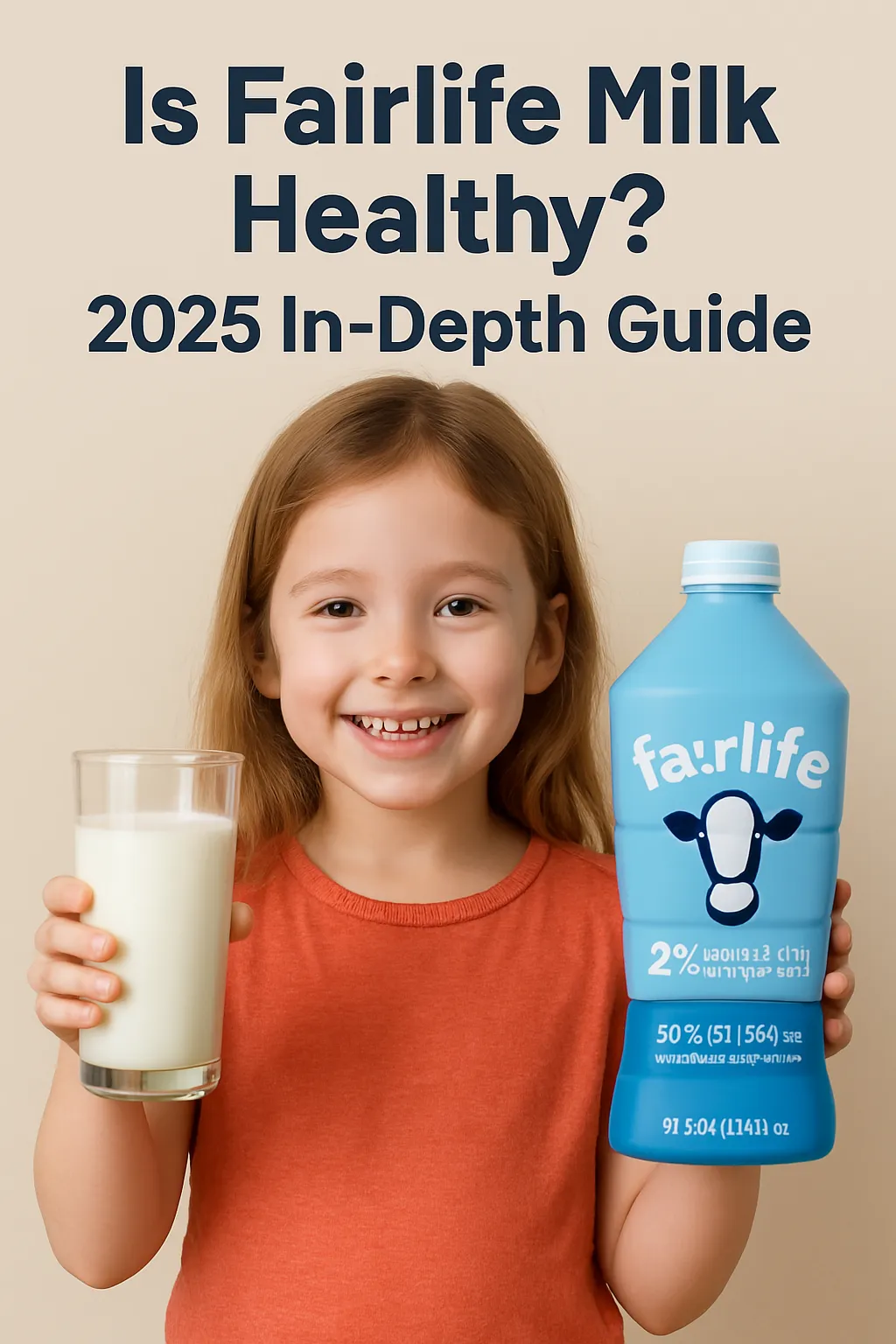
Recommended Articles:
- Taco Bell Breakfast Hours: Ultimate 2025 Guide
- Burger King Menu: In-Depth Guide 2025
- Chipotle Menu: In-Depth Guide 2025
- Taco Bell Menu: In-Depth Guide 2025
- Places to Eat Near Me: Ultimate Guide (2025 Edition)
- Honey Baked Ham 2025 In-Depth Guide
- How to Organize Kitchen Cabinets 2025 In-Depth Guide
- 100 Easy Dinner Ideas 2025 In-Depth Guide
- Easy Dinner Recipes: 2025 In-Depth Guide
- KFC Menu: In-Depth Guide 2025
- Chick-fil-A Breakfast Hours: In-Depth Guide 2025
- 100 Best Milks: A Comprehensive Guide 2025
- 100 Breakfast Ideas: Nutritious Delicious 2025
- 100 Easy Dinner Ideas: Delicious Meals 2025
- Easy Dinner Recipes 2025(In-Depth)
- 100 Quick Dinner Ideas 2025 In-Depth Guide
- Easy Dinner Ideas: 2025 In-Depth Guide
- McDonald Breakfast Hours: 2025 In-Depth Guide
- What Time Does McDonald’s Stop Serving Breakfast 2025?
- Is Fairlife Milk Healthy? 2025 In-Depth Guide
- Creative Spongebob Party Food 2025 In-Depth Guide
- Easy Spongebob Party Food Ideas 2025 In-Depth
- How To Make Canes Sauce 2025 In-Depth Guide
💬 Why Tip? It’s Not Just Money — It’s Motivation ❤️
| 😊 What You Got | 🎁 What I Get | 🔗 What You Can Do |
|---|---|---|
| ✔️ A smile or laugh | ✔️ A reason to keep creating | 👉 Buy me a coffee ☕️ |
| ✔️ Useful tips, insights, or ideas | ✔️ Proof that this content helps | 👉 Click the support button 💸 |
| ✔️ Fun, relatable content | ✔️ Motivation to go deeper & better | 👉 Leave a tip + kind feedback 🙌 |
| ✔️ Ad-free reading experience | ✔️ A little financial breathing room | 👉 $1 isn’t too little, $10 isn’t too much 🎉 |
| ✔️ A sense of connection | ✔️ The joy of being seen and supported | 👉 Let me know you’re out there 👀 |
❤️ If you made it this far, maybe that’s your sign to support? Every tip matters!

